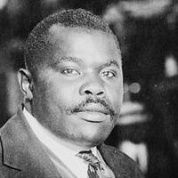Marcus Mosiah Garvey was born August 17, 1887, in St. Ann's Bay, Jamaica. He was the youngest of 11 children and one of two to reach adulthood.

OPINION:
Why Black August Should Be Celebrated Across the Americas
During the U.S. Civil Rights movement, Rev. Martin Luther King Jr. referred to Garvey as “the first man, on a mass scale, to give millions of Negroes a sense of dignity and destiny.”
Over the course of his life, Garvey rose to international recognition as a Black nationalist and Pan-Africanist leader. Garvey strongly advocated for the return of African descendants in the Diaspora to their ancestral lands: the African continent. Garvey is remembered for his contributions to building an internationalist black movement in the early 1900s.
He founded the Universal Negro Improvement Association and African Communities League. Approximately one million people globally belonged to the UNIA-ACL at the height of its membership. The organization emphasized Black empowerment through economic, social and political freedom. Garvey launched an array of initiatives ranging from the Negro Factories Corporation, a publishing house to grocery store cooperatives to engage Black people internationally in a collective effort toward liberation.
In 1918, Garvey established the publication, The Negro World which dedicated its pages to Garvey's message of freedom to Black people across the world. The paper grew to a weekly circulation of 200,000 across the American continent, Europe and Africa. When Garvey returned to Jamaica in 1932 he also started The Blackman and The New Jamaican.
In 1919, Garvey launched the Black Star Line, the first shipping company owned and operated by an all Black crew. The Black Star Line had three ships by 1920 and focused on trade and moving Black passengers between the Americas (largely the United States and the Caribbean) and Africa.
Garvey insisted that "a people without the knowledge of their past history, origin and culture is like a tree without roots." As such, the Black Star Line encouraged contact and communication across the African diaspora and Africa.
OPINION:
Pan-Africanism, Feminism and Finding the Missing Women
Garvey's political vision, promoted by the UNIA-ACL as the African Redemption movement, and later Garveyism, inspired Black Liberation movements to come. He pushed for descendants of the African diaspora to re-establish their relationship to Africa and to challenge European colonialism in the region. In 1925, Garvey published "African Fundamentalism" in The Negro World, in which he states, "The world today is indebted to us for the benefits of civilization. They stole our arts and sciences from Africa. Then why should we be ashamed of ourselves? Their modern improvements are but duplicates of a grander civilization that we reflected thousands of years ago, without the advantage of what is buried and still hidden, to be resurrected and reintroduced by the intelligence of our generation and our posterity."
Between 1936 and 1938, Garvey attended UNIA-ACL conventions in Toronto, Canada and later established the School of African Philosophy.
In 1940, Garvey suffered two strokes and died in London at age 52.
Among many posthumous honours, the Jamaican government named Garvey a national hero in 1964, building a shrine in his honor.